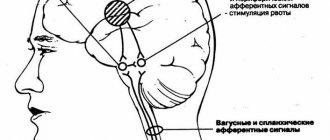Despite the knowledge of physiological processes, each woman’s pregnancy is unique. There is a difference in everything - from what first signs of pregnancy the expectant mother will notice, and ending with how her well-being will change at the time of childbirth. Even the same woman who has given birth to several children may have different pregnancy symptoms each time.
In addition, the first signs of pregnancy may feel similar to the sensations before and during menstruation, so the woman does not immediately understand that conception has occurred. In this article, Women First experts talk about symptoms that may indicate pregnancy.
What are the first signs of pregnancy?
Unprotected intercourse leads to pregnancy in 40% of cases, but determining whether conception occurred during the first few weeks is quite difficult. Even a pregnancy test will not always be able to clarify the situation, because it must be carried out starting from a missed period. The only way to find out if you are pregnant with a 100% probability is to visit a doctor, but, unfortunately, it is not always possible to make an appointment with a doctor on the same day.
The first signs of pregnancy can make themselves felt almost immediately after conception, and in order not to suffer from the unknown, you just need to listen to your body. True, in most women these signs appear only at the end of the first month of pregnancy, and may not make themselves felt at all. It is possible to reliably find out whether you are pregnant only after implantation of the embryo and the beginning of a large-scale restructuring of the female body. A woman’s hormonal background changes significantly: in order for pregnancy to pass without complications, the entire body must prepare for intensive work for nine months.
A gestational dominant, or pregnancy dominant, occurs. Simply put, this is a program embedded in the nervous system in order to maintain the vital activity of the embryo, and then the fetus. The gestational dominant is formed immediately after implantation of the embryo into the uterine mucosa due to constant nerve impulses. This phenomenon serves as the beginning of changes in the life of the expectant mother, manifesting itself in several signs that are often found in the early stages of pregnancy.
Symptoms subside in the second trimester
During pregnancy, you may experience all of these signs and symptoms, and some women may only experience one or two. Many of these symptoms you experience in the first trimester will begin to disappear in the second trimester. Be sure to tell your doctor about any symptoms that interfere with your daily life.
Womenfirst
- Pregnancy, childbirth, the first years of a child’s life: to help the expectant mother: [16+] / Larisa Anikeeva. — St. Petersburg: All, 2018.
- Obstetrics and gynecology. 2021, No. 2.
- Obstetrics and gynecology 4th edition revised 2019.
- Research methods in gynecology: educational manual / S. P. Pakhomov, O. B. Altukhova, E. V. Zhernakov 2018
- Educational and methodological manual for classes in the discipline “Gynecology” T. A. Ayvazyan Eco-Vector, 2021.
RUS2216258 (v1.0)
Taste preferences change.
A woman may have an aversion to food that she used to love. Another option is also possible: a sudden craving for foods that you don’t like in taste or smell. Loss of appetite, especially against a background of constant nausea and malaise, as well as constant hunger, are common signs of pregnancy in the early stages. The desire to try something inedible or in an unusual combination is more typical for 4-12 weeks of pregnancy, but there are cases when a woman notices this symptom already at 2-4 weeks. It is quite possible that the desire to taste chalk or eat a sausage sandwich thickly spread with orange jam is the body’s attempts to report a lack of microelements in the body. There is no need to worry ahead of time: carrying a child requires a large amount of resources, so the body tries to prepare in time and collect reserves “for two.”
What is the tactic for referring a pregnant woman for an x-ray?
I want you, as patients, to understand the entire logical chain of a doctor making such a decision.
1. We make a presumptive diagnosis and understand that in this case an x-ray is needed.
2. We make sure that in a particular situation we cannot replace x-rays with another research method (for example, ultrasound).
3. We weigh the risk-benefit ratio for mother and fetus during X-ray examination. We calculate all possible options for the development of the disease and complications.
4. Once again we are convinced that an x-ray is still needed.
5. We send the pregnant woman for an x-ray according to vital indications. During x-rays, we use protection (lead apron) for maximum protection of the fetus - this is called shielding.
6. If a woman refuses an x-ray, we take a written refusal. We explain all possible consequences, complications and variants of the course of the disease if you refuse this study.
7. We draw up a treatment and examination plan in such a way as if our fears, which an x-ray could show, were confirmed. Or we choose a wait-and-see approach (observe), if possible.
7. We use all other research methods to maximally confirm the diagnosis and prescribe correct and adequate treatment!
Sudden mood swings.
You woke up in a good mood, but a minute later absolutely everything irritates you? This is not a mental disorder. Until hormonal levels stabilize, constantly changing emotions, a sudden transition from negative to positive, can accompany a woman throughout pregnancy. Explain to your loved ones that now you are more sensitive to everything that happens around you. When your hormonal levels return to normal, you will feel better. This usually happens in the second trimester of pregnancy. If emotional problems bother you too much, be sure to ask your doctor to prescribe you a mild sedative that is not contraindicated for pregnant women.
Sensitivity to odors
One of the differences between PMS and pregnancy before pregnancy is an increased sensitivity to odors or a distortion in the perception of odors. Previously pleasant smells can become unpleasant and cause nausea, and you may like aromas that you previously did not pay attention to.
There is little scientific work explaining odor sensitivity. But there is a review2 based on long-term observations (from 1922 to 2014), which states that in the first trimester of pregnancy, women report an increased intensity of odors.
Constant fatigue and loss of strength.;
These early signs of pregnancy occur primarily as a result of the body's natural reduction in immune defenses so that the embryo can fully grow and develop. Try to reduce your stress at home and at work and distribute tasks in such a way that you do not get tired. You should not drink a lot of coffee and supplements with a high caffeine content: it depletes the body's internal resources, giving a temporary boost in strength for a short time.
It is important!
- Protein is needed for normal sperm viability and motility, so it is important for a man to monitor the amount in his diet. The female body must also receive enough proteins: this is a building material for the body.
- It is important to control the amount of fat. Both a lack and excess of fats in the diet can affect hormonal levels. It is worth observing the golden mean.
- It is better for both men and women to avoid foods containing large amounts of chemical additives, as well as alcohol.
Physical exercise.
Physical inactivity harms all systems of the body, including reproductive. Moderate physical activity is indicated to improve metabolism, which in turn increases the likelihood of conception. Of course, excessive fanaticism, as in the case of nutrition, is inappropriate: excessive overload will only harm the body and reduce the likelihood of getting pregnant. It is necessary to maintain a level of physical activity that does not cause serious stress to the body. This will allow:
- keep the body in good shape;
- normalize metabolism;
- strengthen muscles, which is especially important for successful pregnancy;
- improve sleep;
- increase libido.
The effect of physical activity on emotional well-being is also important. Stress reduces your chance of getting pregnant, and moderate activity is a good way to relieve it. It is recommended for both parents to reconsider their lifestyle: both the female and male reproductive systems will benefit from healthy exercise. If the couple has already practiced sports or fitness, they can continue, but avoiding overload.
Heaviness and nagging pain in the lower abdomen.
These symptoms of pregnancy in the early stages are observed in almost every pregnant woman and are associated with increased blood circulation in the pelvic area during the attachment of the embryo to the wall of the uterus. The heaviness is similar to premenstrual and usually does not cause serious discomfort. Severe pain can be a sign of ectopic pregnancy, miscarriage and other pathologies, so it is important to see a doctor as soon as possible. Acute pain combined with bleeding is a symptom that requires emergency medical attention.
Features of dental x-ray
Dental radiography has several types. The choice of a specific type of dental x-ray during pregnancy, as well as without it, is influenced by the purpose of the study (whether it is possible to do x-rays in principle is decided by the doctor).
If you need to see the structure of the jaw, examine the entire upper and lower dentition, assess the condition of the gums and bone tissue, it is best to do orthopantomography. In another way, such an X-ray is called a “panoramic image.”
If the doctor is only interested in one specific tooth (or several adjacent ones) and its features, it is better to take a targeted picture using a computer visiograph.
Both of these X-ray diagnostic methods are characterized by minimal radiation exposure, so if there is an urgent need, one of them can be prescribed to a pregnant woman (preferably in the second trimester).
Security measures
Before X-rays are taken, the patient must wear a protective vest or apron. Inside it is a lead plate that blocks the X-rays and prevents them from affecting areas that are not being diagnosed.
Before any type of x-ray, the patient should remove metal objects from himself, as they can interfere with the passage of x-rays, which will negatively affect the quality of the image.
Contraindications
It is generally accepted that the first trimester of pregnancy is a contraindication for dental x-rays. It is in the initial period that all the organs and systems of the child are formed, and in no case should you interfere with this process or interfere with it. Even if a woman has a certain pathology of the oral cavity that requires detailed diagnosis, x-rays are usually postponed until the second trimester.
When can you do without a photo?
When dental caries is visible to the naked eye or gum pathology is clearly visible, the dentist can begin treatment without an x-ray.
If the patient is diagnosed with cementoma, an abscess has developed, or multiple cysts have formed, the x-ray may turn out dark and uninformative. In this case, there is no point in going through such a procedure.
Heaviness and nagging pain in the lower abdomen.
These symptoms of pregnancy in the early stages are observed in almost every pregnant woman and are associated with increased blood circulation in the pelvic area during the attachment of the embryo to the wall of the uterus. The heaviness is similar to premenstrual and usually does not cause serious discomfort. Severe pain can be a sign of ectopic pregnancy, miscarriage and other pathologies, so it is important to see a doctor as soon as possible. Acute pain combined with bleeding is a symptom that requires emergency medical attention.
The first symptoms before the absence of menstruation
However, if it is difficult to wait until the scheduled date of menstruation, the first symptoms before the absence of menstruation are most often:
- spotting (implantation bleeding);
- increased basal temperature;
- sensitive breasts;
- fatigue;
- nausea;
- bloating;
- increased need to urinate;
- aversion to certain foods;
- fainting;
- constipation;
- headache;
- backache;
- increased salivation;
- metallic taste in the mouth;
- thirst;
- dyspnea.
Frequent urge to urinate.
The nerve endings located in the bladder react to even the slightest impact. The growing uterus puts pressure on the bladder during pregnancy, causing a constant desire to visit the restroom. This symptom is often detected at 5-6 weeks of pregnancy after a missed period, but can appear already at the beginning of the first trimester due to individual characteristics. There is evidence that progesterone reduces the tone of the bladder, which affects its physiology.
Features of the course of teenage pregnancy
In an adult woman, the course of pregnancy differs from that of a teenager, whose body is not fully formed.
Features of pregnancy at an early age include:
- There is a high probability of complications during pregnancy, which is why the girl must be observed by several specialists at once.
- More attentive management of pregnancy, since the gynecologist needs not just to observe the patient, but to plan her diet and select specialized medications for the healthy development of the baby.
- Possible problems with breastfeeding that arise due to the immaturity of the girl’s body.
- There is a high probability of premature birth, which is why teenage mothers are sent to the maternity hospital much earlier than usual - no later than the 36th week of pregnancy.
- If the pregnancy continues, the teenager is additionally recommended to visit a psychologist. The specialist’s task is to help the girl adapt, accept her new role as a mother, in order to prevent panic and nervous breakdowns on her part.
Dizziness, fainting.
Brief loss of consciousness is usually associated with pressure changes. Even if a woman has never lost consciousness before, she should be especially careful. If you feel dizzy, you should provide access to fresh air: ask those nearby to open the window and ventilate the room. To avoid fainting, try to choose loose clothing made from natural materials that is appropriate for the weather. If your job involves physical labor, then you should consider reducing your workload during the day.
Why is it important to know about early pregnancy?
During pregnancy, every week matters, but it is in the first trimester that the main internal organs of the child are formed. If you learn to correctly identify the first signs of conception, you can promptly adjust your lifestyle and diet to avoid miscarriage, and conduct early diagnosis to identify genetic diseases.
Often at the initial stage of pregnancy, symptoms similar to colds appear. If a woman suspects conception, medications that are safe to take in the first trimester should be selected.
Breast sensitivity increases.
Even a slight touch to the mammary glands can cause pain; some women experience colostrum discharge from the nipples. Later, the breasts swell, enlarge, and the nipples darken. These are some of the signs that pregnancy manifests itself in the early stages. You may notice chest tenderness when moving or playing sports. Try wearing loose underwear that doesn't restrict movement. It is worth stopping active physical activity for a while, replacing it with yoga and stretching. Give preference to clothes made from soft materials that do not cause you discomfort.
Preparing for conception
To make your pregnancy successful, it is better to prepare for it. Couples planning a child adjust their lifestyle in such a way that the processes in the body that promote conception proceed without interruption, and the likelihood of pregnancy increases.
Visit to the gynecologist.
A woman who is planning to conceive a child should be regularly monitored by a doctor. The specialist will conduct an examination, tell you if there are any problems in the body that should be eliminated before conception, and give recommendations for adjusting your lifestyle. If problems are observed, the doctor will identify their cause and prescribe treatment. However, the gynecologist is not the only specialist who needs to be visited during this period. It is advisable to check your health in several areas: pregnancy is a serious burden on the body. It is advisable to eliminate in advance factors that may interfere or harm during pregnancy. A man should also be examined: the quality of sperm is no less important for successful conception than the condition of a woman’s body.
Heartburn.
The appearance of heartburn in the early stages is also explained by changes in hormonal levels. This symptom can occur at the very beginning of pregnancy and does not disappear until childbirth. A feeling of discomfort or burning behind the sternum is provoked by the reflux of acidic stomach contents and usually does not indicate a serious pathology. Drinking chocolate, strong tea and coffee, as well as citrus fruits increases heartburn attacks. You may want to avoid these foods at least during the first trimester of pregnancy. Wearing tight and uncomfortable clothing can also cause heartburn. It is worth monitoring your diet more carefully and avoiding long periods of time between meals.
What to do: maintain or terminate the pregnancy?
The final decision must be made only after the girl is examined by a gynecologist. The specialist will assess the health status of the teenager, analyze the development of pregnancy and its duration.
Neither physiologically nor morally young girls are ready for childbirth and motherhood. And no matter what decision is made, there are rarely consequences to avoid.
When deciding to terminate a pregnancy, you should remember several points:
- abortion is a serious psychological trauma;
- difficulties with subsequent conception are likely, including infertility;
- hormonal balance is disrupted;
- immunity decreases, destabilization of the endocrine system occurs;
- the risk of puncture of the uterus increases due to its underdevelopment;
- there is a risk of developing serious inflammation;
- there is a possibility of incomplete removal of the fertilized egg;
- the menstrual cycle is disrupted.
Having maintained the pregnancy, a girl may face the following problems:
- changing the usual way and rhythm of life;
- the need to take care of the baby, for which the girl is not mentally prepared;
- psychological discomfort caused by judgment from other people;
- lack of funds, since not all parents have the opportunity to help, some refuse help altogether;
- lack of maternal feelings for the child due to the girl’s emotional immaturity.
Russian legislation establishes the right of choice for 15-year-old adolescents, so they can independently decide whether to continue or terminate a pregnancy.
Increase in basal temperature.
The indicator measured rectally varies depending on the woman’s hormonal background. Basal temperature can indirectly determine both ovulation and pregnancy. In the early stages, the rectal temperature rises, and pregnancy is indicated by the fact that there is no decrease in the value after a few days, as with normal cyclic changes. If this is not your first attempt to find the happiness of motherhood, then you most likely know the rules for measuring basal temperature: the correct value is the one obtained immediately after a night's sleep, without getting out of bed. Stress can affect your test results, so it's a good idea to calm down or take a medication approved by your healthcare provider before going to bed.
It is important!
- The sperm is able to reach the egg pushed into the fallopian tube in about 2 hours, after which fusion occurs.
- One sperm, the first to penetrate the membrane, merges with the egg, after which it becomes impenetrable to others. A zygote is formed - a cell from which the embryo will begin to develop.
Implantation of fertilized egg.
Over the next few days, under the influence of muscle contractions and cilia of the mucous membrane, the fertilized egg moves towards the exit of the fallopian tube, that is, to the uterus. Around the same period, the process of fragmentation begins: the cells of the zygote begin to divide, but its overall size does not increase, each subsequent cell becomes smaller than the previous one. Having descended into the uterus, the zygote reaches the blastocyst stage in a few days, after which it gets rid of the membrane and is implanted inside the endometrium - the lining of the uterine walls. Under the influence of the hormone progesterone, aimed at maintaining pregnancy, the endometrium becomes thicker and surrounds the fertilized egg on all sides. Implantation allows you to protect the embryo and additionally nourish it with the secretion produced by the endometrial glands. Several days usually pass from conception to implantation, and the countdown of the first embryonic week does not begin with it, but with the formation of the zygote.
Toxicosis.
Toxicosis of pregnant women usually appears at 4 or 5 weeks after conception, but nausea and vomiting can begin to bother the expectant mother as early as the first month. Nausea is usually accompanied by weakness, lack of appetite, and headache. These symptoms during pregnancy cause a lot of trouble for the expectant mother, especially if vomiting is repeated and interferes with daily activities. Antiemetics that are not contraindicated for pregnant women are available today at any pharmacy, but you should consult a doctor before using them.
The first symptoms of pregnancy - experiences of pregnant women
In a study conducted by the American Pregnancy Association, a group of pregnant women were asked what the first pregnancy symptom they noticed was. The answers are as follows:
- absence of menstruation was the first signal for 29% of pregnant women;
- nausea was the response in 25% of pregnant women surveyed;
- breast tenderness was recorded in 17% of pregnant women;
- 8% of pregnant women reported unusual fatigue;
- 3% of pregnant women reported spotting as the first symptom of pregnancy.
The remaining symptoms - increased appetite, more sensitive sense of smell, increased gas production, constipation, mood swings, etc. - were mentioned by less than 2% of pregnant women.
The appearance of acne.
This symptom is also associated with hormonal changes in the body. Acne can appear even in women who have never suffered from it before. Acne during pregnancy usually disappears when hormonal levels stabilize and no longer bothers the woman. You can often miss this phenomenon, mistaking it for a component of premenstrual syndrome, especially if you have previously been treated for acne. Topical, and especially systemic, retinoids can adversely affect fetal development, so you should stop using these medications if there is a delay.
Changes during pregnancy that can happen to a woman
Pregnancy is a wonderful time, but a woman should know that various bodily changes occur during this most delicate period of life.
Bladder control may be lost
There is a frequent urge to urinate. Some pregnant women may have an “accident” when sneezing or even laughing.
Breast milk begins to flow before the due date
Early lactation occurs in the last few months or even weeks of pregnancy, when the body is ready to welcome the baby. This is a completely natural phenomenon.
You will need larger shoes
Foot swelling occurs for two reasons: During pregnancy, the body retains more water, and the uterus puts pressure on the veins, which reduces the body's ability to successfully transport blood to the extremities. There is no need to buy 20 new pairs of shoes at once, because after childbirth you will return to your previous size.
Skin may change color
In a phenomenon known as hyperpigmentation, a pregnant woman's body produces more melanin than normal, which can cause blemishes to appear on the skin - usually on the forehead and cheeks.
Gums may bleed
Increased blood flow and hormonal changes can lead to swollen gums. They become very sensitive and begin to bleed.
Sensitivity to smells increases and taste sensations change
During pregnancy, many foods may smell and taste different. So while a woman may not be able to watch, much less taste, the steak, that's why the ice cream will taste better than ever.
Stomach itches
Towards the end of pregnancy, the skin of the abdomen may begin to itch uncontrollably. This is caused by a combination of dry skin and the fact that as the baby grows, the skin stretches.
Voice may change
As estrogen and progesterone levels in the body change, the vocal cords may swell, causing the voice to suddenly change in tone. It becomes like a boy's during puberty.
Increased abdominal volume.
To bear a child, not only the mother’s internal resources are required, but also reliable protection. The layer of subcutaneous fat in the abdomen is necessary to maintain the optimal temperature of the internal organs. Weight gain in this area is a feature of the female body that has existed since ancient times, which allows, in case of hunger, to use reserves as an energy substrate to support the life of the expectant mother and baby. Eating “for two” is not an option in this case: it is worth distinguishing between emotional and physical hunger. Excessive weight gain is harmful to the baby and complicates the course of pregnancy, and is also a risk factor for gestational diabetes.
And yet, the main symptom, the appearance of which may mean pregnancy, is a delay in the onset of menstruation for more than three days
. Obstetrics classifies it as probable signs, and the above symptoms are only speculative. From the very first days of the delay, the presence of pregnancy is confirmed with fairly high accuracy using special tests that respond to an increase in the content of hCG (human chorionic gonadotropin) in the urine. These are various test strips that are convenient to use at home. There are several rules that reduce the likelihood of false positive and false negative results:
- It is worth using morning urine, since the hCG content in it is higher.
- It is not recommended to increase the amount of fluid consumed before the test. Urine diluted with water has a lower concentration of the hormone and is not informative for the test.
- It is important to check the expiration date of the test. Expired tests may show incorrect results.
The most rational decision if the test result is positive is to consult a doctor in order to determine the quantitative value of hCG and undergo a transvaginal gynecological ultrasound. This procedure allows you to most accurately determine the duration of pregnancy and ensure that the embryo develops inside the uterus, excluding ectopic pregnancy.
It is important!
- There are ready-made vitamin and mineral complexes designed to increase the likelihood of conception. If no serious abnormalities requiring observation by a doctor are identified, you can use them.
- This point also applies to men: the state of the body directly affects the motility and viability of sperm, as a result of which they may lose the opportunity to reach the egg.
- If your doctor does not recommend vitamins in a particular case, it is better to listen to his words. It is also worth choosing supplements after consultation with a specialist.
Nutrition.
Problems leading to failure to conceive are often caused by insufficient or unhealthy nutrition. For pregnancy to occur, an optimal weight is necessary: a lack of it leads to inhibition of reproductive processes, an excess is harmful due to possible endocrine disorders.










